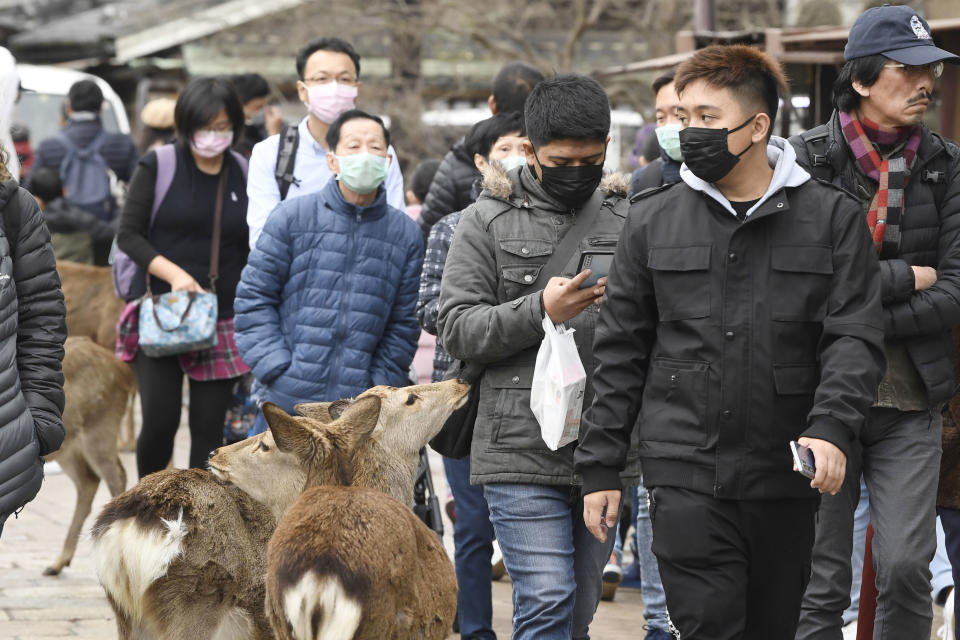PETA releases controversial coronavirus face mask
Controversial face masks pointing the finger at meat sellers for the outbreak of the coronavirus have been launched by PETA (People for the Ethical Treatment of Animals).
PETA announced the new product, bearing the label: “Meat markets breed killer diseases. Go vegan”, on Wednesday, claiming it would help “protect against pathogens”.
The 100 per cent cotton masks and are being sold for about $4, and will be shipped from the US starting February 24.
The organisation claims the one-size-fits-all item will protect people’s face “from dust, wind and bacteria”, and said it would prevent them getting sick while helping to spread the vegan message.

“Animal-borne pathogens will continue to be a risk as long as there are slaughterhouses, factory farms, and live markets,” the website advertisement states.
“Wearing our mask is a great way to help prevent illness while getting the word out that eating meat is completely unnecessary and that using animals for food is cruel to the animals, extremely unhealthy for humans, and devastating for the environment.”
'Fast moving situation': Australian cities ranked among those most at risk of coronavirus
Seven coronavirus cases confirmed across three Australian states
Husband's harrowing decision to leave wife behind to escape coronavirus epicentre
The launch sparked a mixed reaction online, with some saying the masks would not be effective in protecting people from strains of the coronavirus.
On Wednesday the federal government had announced one million masks will be released from a medical stockpile in the wake of the coronavirus.
“A cotton mask will not protect against any viral infection, much less this coronavirus,” one person wrote.

They may have a point, with a study showing cloth masks might actually increase the risk someone could be infected, as they absorbed more particles than medical masks.
Authors of the study speculated the moisture retention and poor filtration of cloth masks could explain why they were more likely to take in potentially harmful bacteria.
Referring to the research, Professor Raina MacIntyre, lead study author and head of UNSW’s School of Public Health and Community Medicine, discouraged the use of cloth masks “in high-risk situations”.
‘Should be discouraged’
“Cloth masks should not be used by workers in any healthcare setting, but particularly high-risk situations such as emergency departments, intensive care, paediatric or respiratory wards,” Professor MacIntyre said.
“Effective controls of outbreaks and pandemics at the origin impacts us directly, so it is important for global disease control that the use of cloth masks be discouraged in high-risk situations,” she said.
“Despite more than half the world using cloth masks, global disease control guidelines, including those from the World Health Organisation, fail to clearly specify conditions of their use.
“These guidelines need to be updated to reflect the higher infection risk posed by cloth masks, as found in our study.”

While some criticised the vegan face masks, others came out in full support of them and vowed to purchase one for themselves.
“Great idea, strong statement, (and) beautiful design. So amazing,” one person said.
“Great marketing tool,” another wrote.
As of Thursday, there were seven confirmed cases of novel coronavirus in Australia and 7711 cases on mainland China.
Out of 170 people killed by the virus, most died in the central Hubei province, where the illnesses began in December.
Melbourne diners who ate at a Glen Waverley Chinese restaurant between 5.30pm and 7pm on January 26 have been warned they may have been exposed to coronavirus.
Do you have a story tip? Email: newsroomau@yahoonews.com.
You can also follow us on Facebook, Instagram and Twitter and download the Yahoo News app from the App Store or Google Play.



